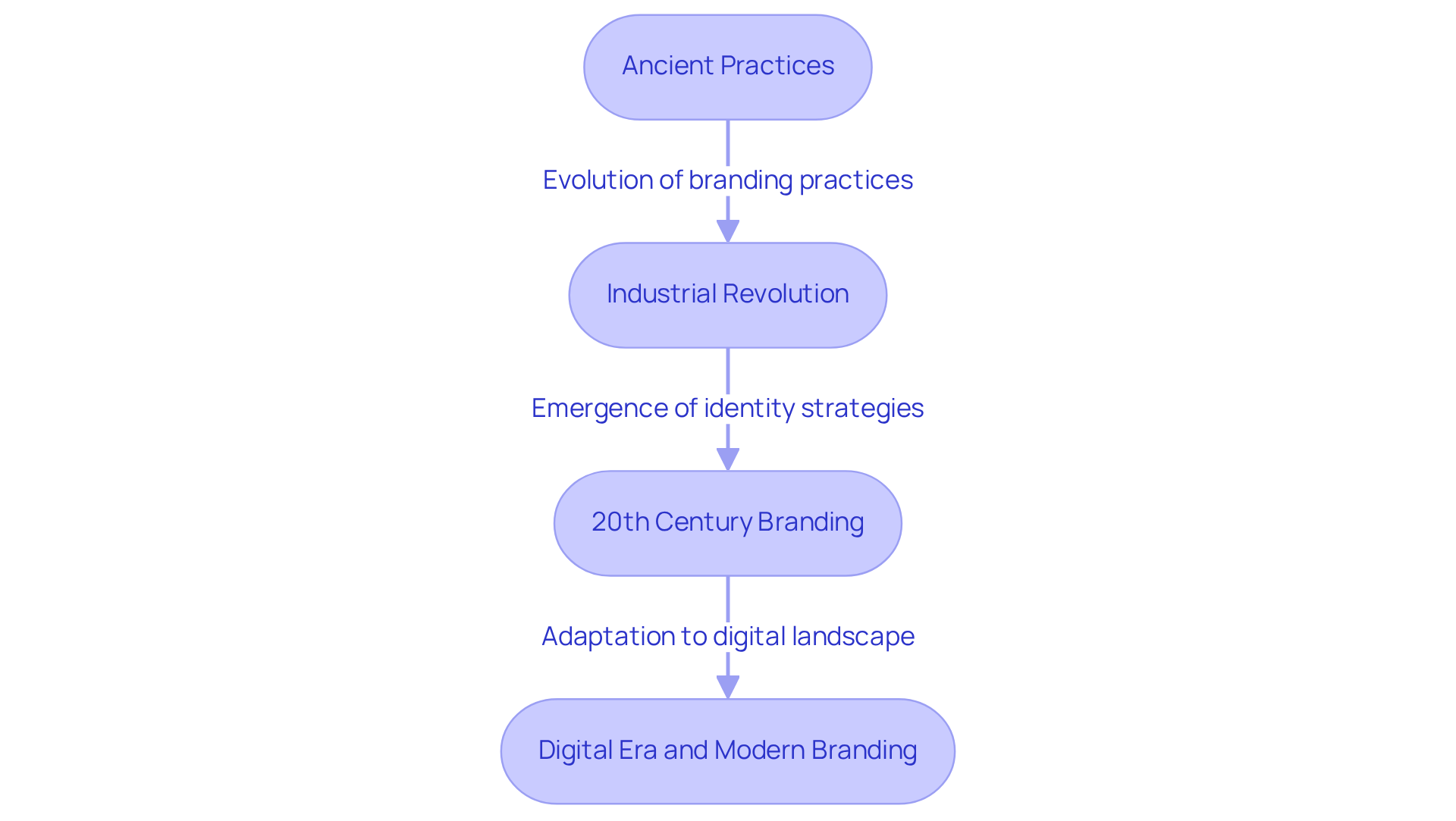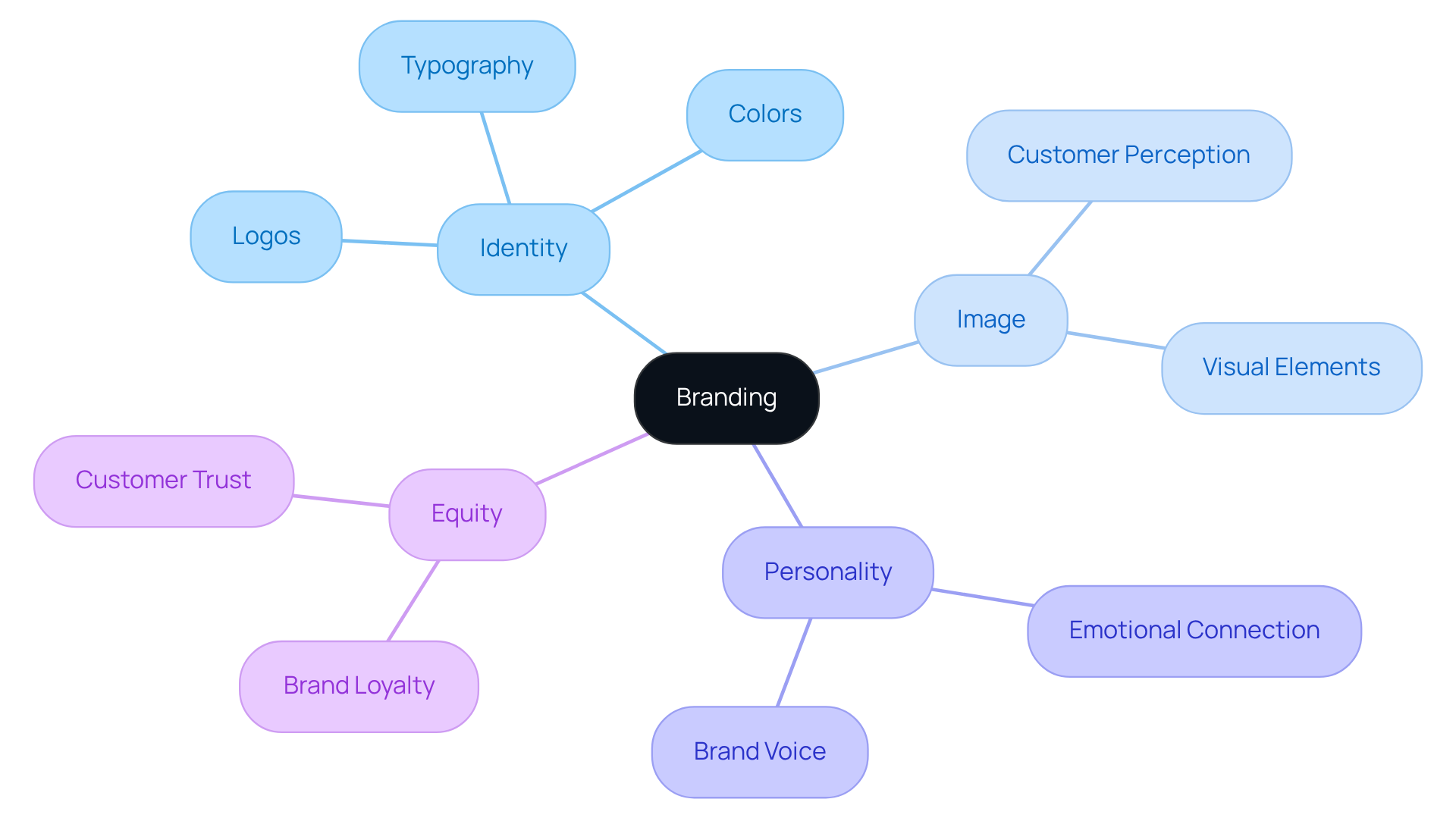Overview
In today's competitive landscape, many brands struggle to forge genuine connections with their customers. This disconnection often stems from a lack of understanding of what branding truly encompasses. The article delves into the definitions of branding, illuminating its core concepts, historical evolution, and key characteristics that shape a brand's identity and foster customer connections. It highlights that effective branding transcends mere visual elements; it nurtures emotional bonds and builds trust. Statistics reveal that a significant majority of consumers prioritize these emotional connections in their purchasing decisions. By embracing these insights, brands can cultivate deeper relationships with their audience, ultimately leading to greater loyalty and success. Together, let's explore how to create a brand that resonates on a personal level, fostering trust and connection with every interaction.
Introduction
Crafting a compelling brand identity can feel overwhelming for many startup founders, especially in a marketplace brimming with choices. It's important to recognize that branding is not just about logos and slogans; it's about the emotional connections that build customer loyalty. As consumer expectations evolve and the digital landscape shifts, the question arises: how can businesses navigate these complexities to create a brand that truly resonates?
This article explores the core concepts and historical context of branding, offering insights into its evolution and the essential elements that contribute to successful branding strategies. Together, we can uncover the path to a brand identity that not only stands out but also fosters lasting relationships with customers.
Defining Branding: Core Concepts and Importance
For many startup founders, the challenge of creating a distinctive identity for a product, service, or organization can make branding feel overwhelming, particularly when trying to understand the definitions of branding. In a crowded marketplace, where options abound, it’s easy to feel lost amidst the noise. This struggle is not just about logos or names; it’s about crafting a narrative that resonates with your audience and aligns with the definitions of branding to set you apart.
According to the definitions of branding, a strong brand identity fosters recognition and builds trust, nurturing emotional connections with customers. In fact, studies reveal that 77% of individuals are more inclined to buy from companies that create a strong emotional connection, underscoring the importance of emotional marketing. Additionally, 81% of shoppers express that trust is crucial before making a purchase, highlighting the need for transparency and reliability from businesses.
RNO1 understands these challenges intimately. By employing innovative marketing strategies, they empower clients to cultivate a compelling online presence, helping them not just survive but thrive in competitive markets. Their approach enhances visibility and significantly influences consumer loyalty and purchasing decisions, making RNO1 an invaluable partner for companies striving for success in the digital age. Together, we can navigate these challenges and build a brand that truly resonates with your audience.
The Evolution of Branding: Historical Context and Development
The ancient practices that laid the groundwork for identity and differentiation are integral to the definitions of branding, where livestock was marked to signify ownership. As societies evolved, the definitions of branding became increasingly important for establishing a unique identity, particularly during the Industrial Revolution. This era represented a pivotal shift, as mass production created a necessity for clear definitions of branding to differentiate among products. Companies began to implement identity strategies to carve out their presence in a crowded marketplace, leading to the emergence of definitions of branding as a formal discipline in the 20th century. Pioneers like Procter & Gamble underscored the importance of brand loyalty and customer engagement, which are crucial definitions of branding for achieving success.
As we transitioned into the digital era, the development of marketing practices continued to evolve. Visual identity expanded to encompass the overall customer experience. Today, the definitions of branding go beyond mere logos or slogans; they involve fostering meaningful interactions that resonate with consumers across diverse platforms. Studies indicate that 68% of firms recognize that consistency in identity contributes to revenue growth, underscoring the importance of unified promotional approaches. RNO1 exemplifies this evolution by integrating advanced UX design principles into their marketing strategies, ensuring that contemporary companies effectively connect with their audiences. Their collaborations with various clients, including the EOS Network Foundation and innovative startups, illustrate how transformative digital identity and performance marketing strategies can enhance engagement and drive success.
This ongoing transformation highlights the necessity of adaptability in the definitions of branding. To meet the evolving expectations of customers in an increasingly digital environment, companies must continually innovate based on the definitions of branding. As a tech startup founder, you may feel overwhelmed by these demands. Remember, you are not alone in this journey. RNO1 is here to support you in navigating these challenges, helping you create a brand identity that not only stands out but also resonates deeply with your audience. Together, we can foster meaningful connections that lead to lasting success.

Key Characteristics of Branding: Elements and Components
Branding can feel overwhelming for many tech startup founders, especially when they reflect on the definitions of branding that encompass key characteristics like identity, image, personality, and equity. The challenge lies in creating a brand identity that aligns with the definitions of branding and resonates with customers. This identity includes visible components like logos, colors, and typography, which are crucial for customer recognition. However, it’s not just about visuals; product image reflects the perceptions held by customers, shaped by their experiences and interactions with the product. This is where the definitions of branding emphasize the importance of the emotional connection.
When a brand identity aligns with the definitions of branding by assigning human characteristics to a product, it fosters emotional bonds that significantly impact customer loyalty. Moreover, a strong reputation signifies the value derived from buyer perceptions, which can enhance the definitions of branding, as well as sales and customer retention.
Consider this: 81% of shoppers need to trust a company before contemplating a purchase. This statistic underscores the importance of cultivating a robust identity and image.
RNO1 understands these challenges and offers a marketing approach that effectively incorporates these elements, enabling clients to create a strong and recognizable presence in the competitive digital marketplace. Together, we can navigate the complexities of branding and build a brand that truly connects with your audience.

Examples of Effective Branding: Case Studies and Applications
Many companies face the challenge of connecting meaningfully with their customers. Take Apple, for instance. They've built a strong identity characterized by minimalist design and a steadfast focus on innovation. This approach has fostered a loyal customer base that eagerly anticipates new product launches, solidifying their status as the world's most valuable brand, valued at over $516.6 billion in 2024. Similarly, Nike’s branding strategy revolves around empowerment and athleticism, resonating deeply with consumers through captivating storytelling and endorsements from elite athletes. This emotional connection is crucial; studies show that 94% of customers are likely to recommend a company they feel connected to on an emotional level.
RNO1’s partnerships with companies like Highline and Cirkul further illustrate the power of personalized digital experiences in enhancing customer engagement and driving sales. By adopting innovative marketing strategies, these companies have carved out a niche in competitive markets. For example, businesses that maintain consistent messaging across various platforms can experience revenue growth of 10-20%, highlighting the importance of cohesive marketing efforts.
As we look to 2025, the marketing landscape is ever-changing. Statistics reveal that 89% of shoppers remain loyal to brands that reflect their values. This alignment between a company’s values and customer expectations is vital for nurturing long-term loyalty. As brands navigate this evolving environment, the ability to forge authentic connections with consumers will remain a cornerstone of success. RNO1 is here to support you in creating those connections, ensuring your marketing strategies resonate with your audience and reflect your core values.
Conclusion
Crafting a distinctive brand identity can feel overwhelming for many startup founders. It’s not just about visuals; it’s about the emotional connections and trust that you build with your audience. As we’ve explored, understanding what branding truly means is essential for thriving in today’s competitive landscape. A strong brand does more than capture attention; it fosters lasting connections that encourage customer loyalty and engagement.
Reflecting on the historical evolution of branding, we see how it has shifted from simple identification marks to rich emotional narratives that resonate across digital platforms. The need for consistency, emotional marketing, and a clear brand identity stands out as crucial for success. Look at companies like Apple and Nike; they illustrate how effective branding strategies can forge powerful emotional connections, resulting in increased customer loyalty and significant market value.
Ultimately, the journey of branding is one of continuous adaptation and innovation. As consumer expectations change, it’s vital for businesses to embrace these shifts and create authentic connections that reflect their core values. By understanding and implementing the key concepts of branding, you can navigate the complexities of the market and build relationships that not only endure but flourish. Remember, committing to a compelling brand identity isn’t just a strategic choice; it’s a vital investment in your future success.
Frequently Asked Questions
What is branding and why is it important for startups?
Branding is the process of creating a distinctive identity for a product, service, or organization. It is important for startups as it helps them craft a narrative that resonates with their audience, fosters recognition, builds trust, and nurtures emotional connections with customers.
How does a strong brand identity affect consumer behavior?
A strong brand identity fosters recognition and builds trust, which are crucial for influencing consumer behavior. Studies show that 77% of individuals are more inclined to buy from companies that create strong emotional connections, and 81% of shoppers consider trust essential before making a purchase.
What role does emotional marketing play in branding?
Emotional marketing plays a significant role in branding as it helps create strong emotional connections with customers. This connection can lead to increased customer loyalty and influence purchasing decisions.
How can companies enhance their online presence through branding?
Companies can enhance their online presence by employing innovative marketing strategies that cultivate a compelling brand identity. This approach increases visibility and significantly influences consumer loyalty and purchasing decisions.
What challenges do startups face in branding?
Startups often face the challenge of creating a distinctive identity in a crowded marketplace, which can make branding feel overwhelming. They need to navigate the complexities of crafting a narrative that stands out and resonates with their target audience.




